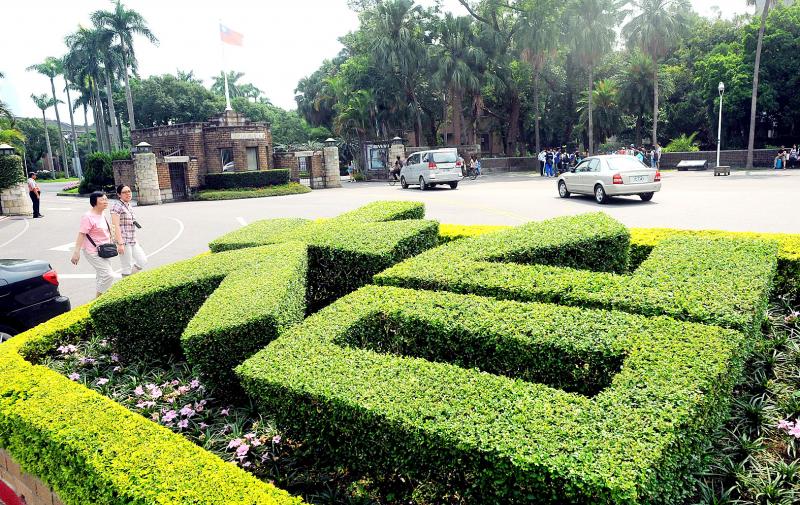National Taiwan University (NTU) was ranked the world’s 97th-best university, the first time it has made the top 100 in the Times Higher Education survey.
The London-based magazine’s World University Rankings 2021, which were released on Wednesday, included more than 1,500 institutions from 93 countries and regions, making it the largest and most diverse university ranking to date.
The universities are ranked based on 13 indicators that measure their performance in five main categories: teaching, research, citations, industry outlook and international outlook.

Photo: Lin Cheng-kung, Taipei Times
With an overall score of 62.3, NTU was the best-performing Taiwanese institution out of 38 local universities that made the list.
It was also the first time that the Taipei-based university was ranked in the top 100 since the list was first published in 2011.
Last year, Taiwan’s top university was ranked 120th, with an overall score of 59.9.
The rise was due to an emphasis on research, NTU said, adding that it owns about 2,000 patents for projects completed by its research teams.
Other Taiwanese universities on the list were Taipei Medical University and National Tsing Hua University, which were ranked in the 301-350 and 351-400 groups respectively.
China Medical University and National Yang-Ming University were in the 401-500 group, while National Cheng Kung University, National Chiao Tung University and National Taiwan University of Science and Technology were in the 501-600 group.
National Taiwan Normal University was in the 601-800 group.
In the 801-1000 group were Asia University, Chang Gung University, Fu Jen Catholic University, Kaohsiung Medical University, National Central University, National Chengchi University, National Dong Hwa University, National Sun Yat-sen University and National Taipei University of Technology.
The University of Oxford in the UK was ranked first for the fifth year in a row, while Stanford University in California was second, followed by Harvard University in Massachusetts in third place.
The remainder of the top 10 were, from fourth: the California Institute of Technology, the Massachusetts Institute of Technology, the University of Cambridge (UK), the University of California, Berkeley, Yale University (Connecticut), Princeton University (New Jersey) and the University of Chicago.

Taiwan is stepping up plans to create self-sufficient supply chains for combat drones and increase foreign orders from the US to counter China’s numerical superiority, a defense official said on Saturday. Commenting on condition of anonymity, the official said the nation’s armed forces are in agreement with US Admiral Samuel Paparo’s assessment that Taiwan’s military must be prepared to turn the nation’s waters into a “hellscape” for the Chinese People’s Liberation Army (PLA). Paparo, the commander of the US Indo-Pacific Command, reiterated the concept during a Congressional hearing in Washington on Wednesday. He first coined the term in a security conference last

Prosecutors today declined to say who was questioned regarding alleged forgery on petitions to recall Democratic Progressive Party (DPP) legislators, after Chinese-language media earlier reported that members of the Chinese Nationalist Party (KMT) Youth League were brought in for questioning. The Ministry of Justice Investigation Bureau confirmed that two people had been questioned, but did not disclose any further information about the ongoing investigation. KMT Youth League members Lee Hsiao-liang (李孝亮) and Liu Szu-yin (劉思吟) — who are leading the effort to recall DPP caucus chief executive Rosalia Wu (吳思瑤) and Legislator Wu Pei-yi (吳沛憶) — both posted on Facebook saying: “I

Sung Chien-liang (宋建樑), who led efforts to recall Democratic Progressive Party (DPP) Legislator Lee Kun-cheng (李坤城), was released on bail of NT$80,000 today amid outcry over his decision to wear a Nazi armband to questioning the night before. Sung arrived at the New Taipei District Prosecutors’ Office for questioning in a recall petition forgery case last night wearing a red armband bearing a swastika, carrying a copy of Adolf Hitler’s Mein Kampf and giving a Nazi salute. Sung left the building at 1:15am without the armband and covering the book with his coat. Lee said today that this is a serious

The Ministry of Economic Affairs has fined Taobao NT$1.2 million (US$36,912) for advertisements that exceed its approved business scope, requiring the Chinese e-commerce platform to make corrections in the first half of this year or its license may be revoked. Lawmakers have called for stricter enforcement of Chinese e-commerce platforms and measures to prevent China from laundering its goods through Taiwan in response to US President Donald Trump’s heavy tariffs on China. The Legislative Yuan’s Finance Committee met today to discuss policies to prevent China from dumping goods in Taiwan, inviting government agencies to report. Democratic Progressive Party Legislator Kuo Kuo-wen (郭國文) said